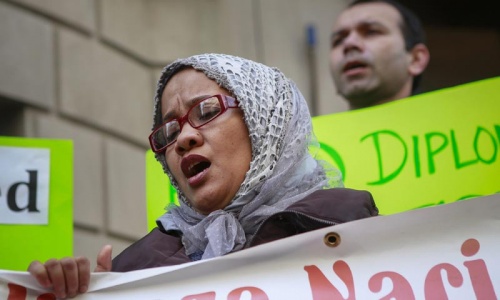MUMBAI: Americans were shocked at the alleged $3.31-per-hour wage paid to an Indian diplomat's housekeeper in a case that has sparked global outrage. But to Rupa Thakur, who does the same job in Mumbai, it sounded like a small fortune.
The mother-of-three works 13 hours a day, six days a week for a family in the suburbs of India's financial capital, taking home 8,000 rupees ($130) a month — or about 38 US cents an hour.
“Life is tough,” said Thakur, 39, who moved to the city from Nepal as an uneducated girl to find work.
“After daily expenses and paying my children's school and college fees, I can save only around 2,000 rupees. With everything getting costlier every day, it is difficult for people like us.”
India erupted in fury last week over America's strip-search and arrest of an Indian diplomat accused of underpaying her housekeeper. But the story of the maid herself has received far less attention back home.
Domestic service is a prominent feature of life in urban India, with a maid seen as a stamp of middle-class membership. Many of those who can afford it also have drivers, cooks and nannies.
Too many hours, too little cash
Such workers often start as young women or girls, like Thakur, who travel from rural areas to try to make a living and support their families, but who often end up working too many hours for too little cash, activists say.
While New York rigidly enforces laws to ensure even the lowliest employees get no less than $7.25 an hour, such legislation is almost entirely absent for Indian domestic workers.
“They need some kind of standardised wage practice in force,” said Mumbai social worker Avisha Kulkarni, who campaigns on the issue.
There are also frequent reports of domestic servants being abused by their wealthy employers.
In November, a New Delhi court ordered an Indian lawmaker and his wife to be held in police custody for allegedly torturing to death a maid at their home.
The case came soon after a teenage maid was rescued from another upscale Delhi home by police and social rights campaigners, who said she had been slashed with knives and mauled by dogs.
The Global Slavery Index, released in October, found an estimated 13.95 million people in India are victims of forced labour — making up almost half of the world's slave population. Domestic service is a key area of concern.
“The central government has completely ignored the conditions of domestic workers,” said Anannya Bhattacharjee, executive council member of the New Trade Union Initiative, who is based in northern Haryana state.
“It's part of Indian feudal tradition. There's always talk of domestic workers being part of the family but they want to be treated as workers,” she said.
But there are also signs of change within the industry.
While demand remains high, Kulkarni said fewer women were willing to serve as live-in maids for one household, preferring to work at a number of homes and charge per task, such as cleaning utensils or washing clothes.
“The standard and cost of living has gone up,” Kulkarni said, adding that many maids had high aspirations for their children and wanted them well-educated.
“They treat us so rudely”
This was the case for Pushpa Khude, another housekeeper in Mumbai, who financed her two children's college education and whose son is now a bank manager.
Khude, 45, cleans and cooks in several households and takes home 24,000 rupees ($385) a month — a relatively high sum for her job in India — after starting work at the age of six watering plants for a Bollywood actor.
Nowadays she only works for expatriates, with no desire to take on Indian employers.
“I'm Indian, but I'm disappointed because other Indians aren't giving us (maids) respect or any responsibility,” she said.
“They treat us so rudely and they don't trust us or give us holiday.” US attorney Preet Bharara, the prosecutor who spearheaded Khobragade's arrest proceedings, wondered why there was little concern in India for the maid and her family.
“One wonders why there is so much outrage about the alleged treatment of the Indian national accused of perpetrating these acts, but precious little outrage about the alleged treatment of the Indian victim and her spouse?” he said in comments earlier this week.
Meenakshi Ganguly, South Asia director at Human Rights Watch, points out that millions of mostly women and girls perform “crucial jobs” around the world as domestic helpers, often enabling employers to pursue careers.
But she said that in India and elsewhere, they remain “among the most exploited”, despite a new international treaty adopted in 2011 to improve their rights.
“India should sign the Domestic Workers Convention, encourage domestic workers to organise, and ensure that their complaints of abuse, including sexual abuse, are promptly addressed,” Ganguly said.













































